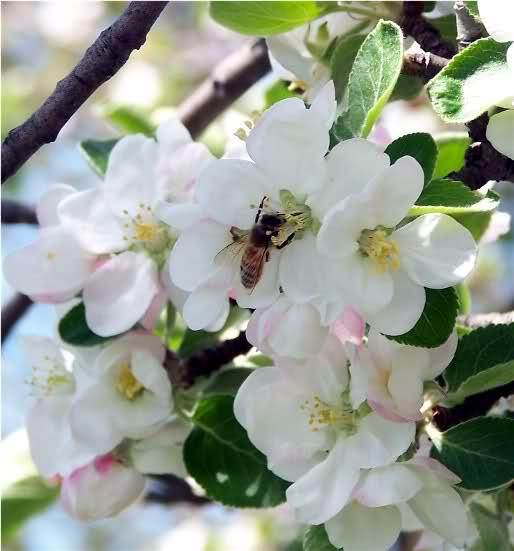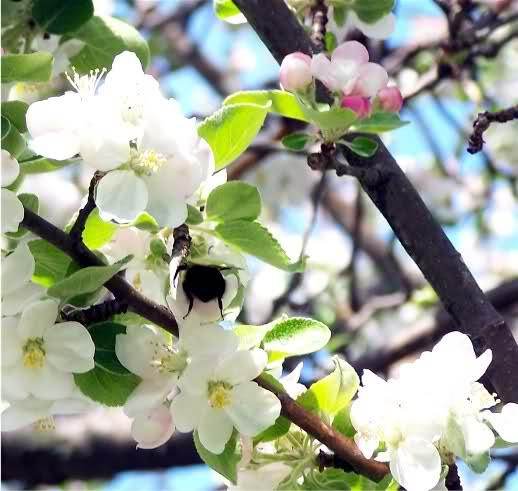




[img]http://i109.photobucket.com/albums/n52/havlik1/permie%20pics2/permiepotrait3pdd.jpg[/img]
"One cannot help an involuntary process. The point is not to disturb it. - Dr. Michel Odent




Brenda
Bloom where you are planted.
http://restfultrailsfoodforestgarden.blogspot.com/








In Community,
Marilene Richardson
Director, SongCroft Self-Sufficiency Skills Apprenticeship Programs
www.songcroft.com
Subscribe to our newsletter!
http://bit.ly/Newsletter_Page
Follow us on Twitter and Facebook




permie mama wrote:
I got 48 pound off of one of my hives last season so we must of learned something.
 ohmy god! I had no idea you could get that much! thanks, you have already sent me in the direction of searches. obivously there are different types of hives, learning to feed them properly, and the possibility of "collecting" them locally all things I didn't know!
ohmy god! I had no idea you could get that much! thanks, you have already sent me in the direction of searches. obivously there are different types of hives, learning to feed them properly, and the possibility of "collecting" them locally all things I didn't know! ) so far my only definite real projects at the new place are gardens and goat housing. bees may not be something I can get to as soon as I move in but it gives me something to think about, I need fodder for my brain. something new. if I don't get it I'm likely to hop a train to the great beyond on a whim!
) so far my only definite real projects at the new place are gardens and goat housing. bees may not be something I can get to as soon as I move in but it gives me something to think about, I need fodder for my brain. something new. if I don't get it I'm likely to hop a train to the great beyond on a whim! [img]http://i109.photobucket.com/albums/n52/havlik1/permie%20pics2/permiepotrait3pdd.jpg[/img]
"One cannot help an involuntary process. The point is not to disturb it. - Dr. Michel Odent










[img]http://i109.photobucket.com/albums/n52/havlik1/permie%20pics2/permiepotrait3pdd.jpg[/img]
"One cannot help an involuntary process. The point is not to disturb it. - Dr. Michel Odent




Brenda
Bloom where you are planted.
http://restfultrailsfoodforestgarden.blogspot.com/





[img]http://i109.photobucket.com/albums/n52/havlik1/permie%20pics2/permiepotrait3pdd.jpg[/img]
"One cannot help an involuntary process. The point is not to disturb it. - Dr. Michel Odent




 1
1




"SONG OF INCREASE: Listening to the Wisdom of Honeybees
for Kinder Beekeeping and a Better World"
http://www.SpiritBee.com
east of Battle Ground, WA (near Vancouver)
Friendly Haven Rise Farm
http://www.FriendlyHaven.com








"SONG OF INCREASE: Listening to the Wisdom of Honeybees
for Kinder Beekeeping and a Better World"
http://www.SpiritBee.com
east of Battle Ground, WA (near Vancouver)
Friendly Haven Rise Farm
http://www.FriendlyHaven.com








Brenda
Bloom where you are planted.
http://restfultrailsfoodforestgarden.blogspot.com/




"SONG OF INCREASE: Listening to the Wisdom of Honeybees
for Kinder Beekeeping and a Better World"
http://www.SpiritBee.com
east of Battle Ground, WA (near Vancouver)
Friendly Haven Rise Farm
http://www.FriendlyHaven.com








"SONG OF INCREASE: Listening to the Wisdom of Honeybees
for Kinder Beekeeping and a Better World"
http://www.SpiritBee.com
east of Battle Ground, WA (near Vancouver)
Friendly Haven Rise Farm
http://www.FriendlyHaven.com








"SONG OF INCREASE: Listening to the Wisdom of Honeybees
for Kinder Beekeeping and a Better World"
http://www.SpiritBee.com
east of Battle Ground, WA (near Vancouver)
Friendly Haven Rise Farm
http://www.FriendlyHaven.com




TCLynx




"SONG OF INCREASE: Listening to the Wisdom of Honeybees
for Kinder Beekeeping and a Better World"
http://www.SpiritBee.com
east of Battle Ground, WA (near Vancouver)
Friendly Haven Rise Farm
http://www.FriendlyHaven.com




TCLynx





"SONG OF INCREASE: Listening to the Wisdom of Honeybees
for Kinder Beekeeping and a Better World"
http://www.SpiritBee.com
east of Battle Ground, WA (near Vancouver)
Friendly Haven Rise Farm
http://www.FriendlyHaven.com





TCLynx




Brenda
Bloom where you are planted.
http://restfultrailsfoodforestgarden.blogspot.com/





"SONG OF INCREASE: Listening to the Wisdom of Honeybees
for Kinder Beekeeping and a Better World"
http://www.SpiritBee.com
east of Battle Ground, WA (near Vancouver)
Friendly Haven Rise Farm
http://www.FriendlyHaven.com




TCLynx wrote:
I can't "keep bees" where I am because "keeping bees" is not an approved use of a residential lot.





Brenda
Bloom where you are planted.
http://restfultrailsfoodforestgarden.blogspot.com/





Gary




"SONG OF INCREASE: Listening to the Wisdom of Honeybees
for Kinder Beekeeping and a Better World"
http://www.SpiritBee.com
east of Battle Ground, WA (near Vancouver)
Friendly Haven Rise Farm
http://www.FriendlyHaven.com















Brenda
Bloom where you are planted.
http://restfultrailsfoodforestgarden.blogspot.com/




Jeni wrote:
Hi bee lovers, I'm taking Jacqueline's Natural Beekeeping class (near Battle Ground) this weekend, does anybody want to carpool? I'm going down on Friday night, returning Saturday after the class. You can e-mail me directly at jenigreni@yahoo.com if you're interested.








Buy Our Book! Food Web: Concept - Raising Food the Right Way. Learn make more food with less inputs
Off Grid Homesteading - latest updates and projects from our off grid homestead








"the qualities of these bacteria, like the heat of the sun, electricity, or the qualities of metals, are part of the storehouse of knowledge of all men. They are manifestations of the laws of nature, free to all men and reserved exclusively to none." SCOTUS, Funk Bros. Seed Co. v. Kale Inoculant Co.

| I agree. Here's the link: http://stoves2.com |





